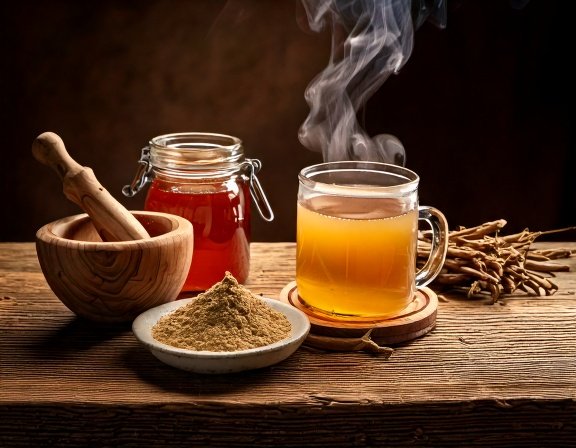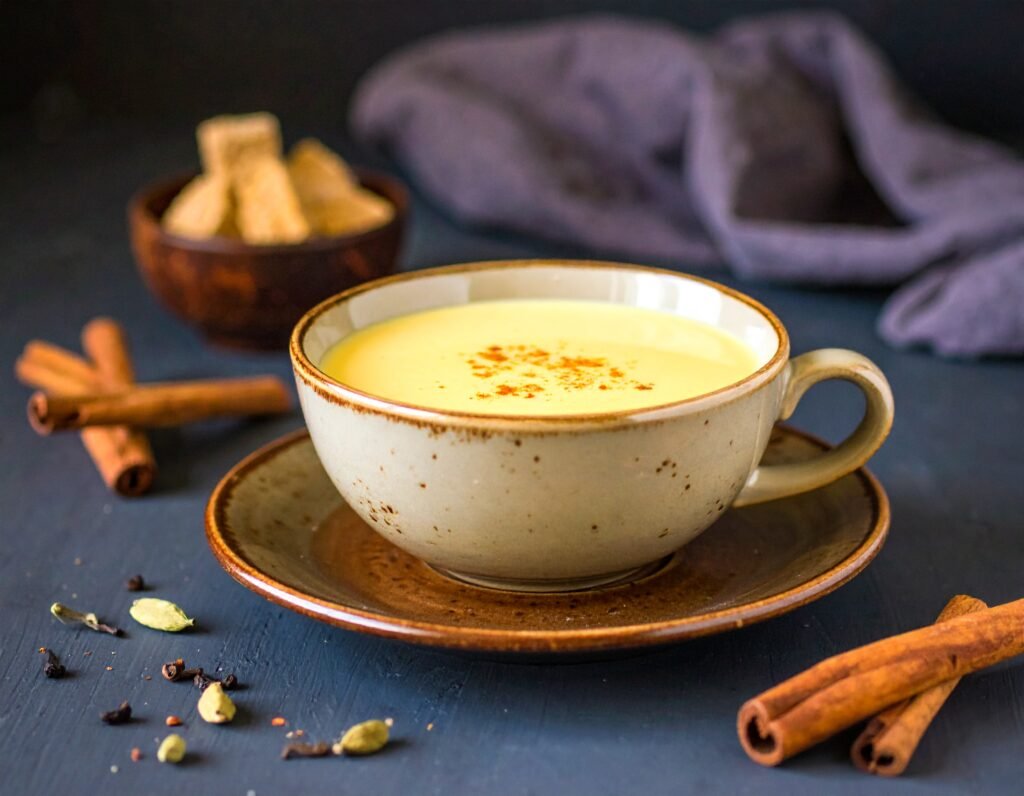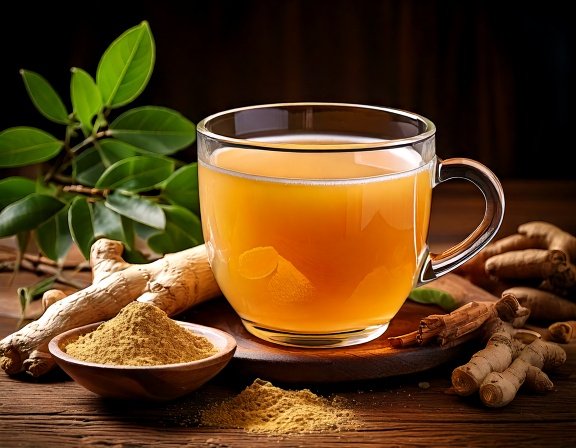How Ashwagandha Root Supports Energy and Hormones
Ashwagandha’s adaptogenic powers: energy, hormone balance, stress resilience, sleep, and cognitive health.

Ashwagandha Sleep & Mood Connection Kit (PDF)
Download our printable best sleep and mood-boosting routines!
Download FreeIn today’s fast-paced, hormone-stressed world, many women find themselves running on fumes—tired but wired, bloated, anxious, and completely out of sync with their natural rhythms. Enter Ashwagandha (Withania somnifera), a root revered in Ayurveda as the “strength of ten horses.”
For over 3,000 years, Ashwagandha has been used to restore stamina, regulate hormones, calm the nervous system, and rebuild strength after stress or sickness. What makes this root so powerful for modern energy and balance? Let’s dig in.

Ashwagandha for Energy, Adrenal Health & Resilience
Ashwagandha (Withania somnifera) is one of the most celebrated adaptogenic herbs in Ayurveda, prized for its ability to restore energy, strengthen the adrenals, and build resilience to stress. Its name means “the strength of a horse,” reflecting its traditional reputation for enhancing stamina and vitality—both physical and mental. Unlike stimulants that provide a quick burst of energy followed by a crash, ashwagandha works by nourishing and balancing the body’s stress response systems, helping you feel calm, focused, and energized from within.
1. Supports Adrenal Health & Stress Response
Chronic stress can deplete adrenal function, leading to fatigue, irritability, and hormonal imbalance. Ashwagandha helps regulate cortisol—the body’s primary stress hormone—by calming overactive adrenal glands and supporting their natural rhythm. This allows for more balanced energy throughout the day and deeper, more restorative rest at night.
2. Enhances Energy & Endurance
Ashwagandha boosts oxygen use and supports healthy mitochondrial function, the powerhouse of your cells. This translates into improved endurance, reduced fatigue, and greater physical strength. Whether you’re managing a busy lifestyle or recovering from burnout, it helps the body maintain steady energy without overstimulation.
3. Builds Resilience & Mental Clarity
By supporting the nervous system, ashwagandha helps reduce anxiety, stabilize mood, and sharpen mental focus. Its adaptogenic nature means it restores balance wherever the body needs it—whether calming an overworked mind or energizing a tired system. Over time, this leads to a greater sense of inner steadiness and emotional resilience.
4. Hormonal & Thyroid Support
Ashwagandha gently supports hormone balance by improving communication between the brain, adrenal glands, and thyroid. This can help regulate menstrual cycles, reduce PMS symptoms, and improve overall hormonal vitality—especially when combined with mineral-rich herbs like nettle or maca.
How to Use:
Take ½–1 teaspoon of ashwagandha powder daily in warm milk, tea, or smoothies. For deeper adrenal support, use for 6–8 weeks consistently, then take a short break. It also pairs well with calming herbs like holy basil or energizing adaptogens like rhodiola for personalized balance.
Quick Tip: Use ashwagandha in the evening if your fatigue is stress-related and you need better sleep, or in the morning if you need lasting energy and focus throughout the day. Its effects build gradually, bringing lasting resilience rather than temporary stimulation.
- Regulates cortisol, helping reduce fatigue and mood swings
- Replenishes adrenal function for chronic stress/burnout
- Improves stamina & endurance; increases VO₂ max, speeds recovery
- Boosts mitochondrial energy (cellular “engines”)
Energy Tip: Start with 300–600 mg of Ashwagandha extract in the morning to support daily energy and reduce midday slumps.
Science Note: A 2012 double-blind, placebo-controlled study found Ashwagandha significantly reduced cortisol and improved stress resistance in 60 days.


Shop Ashwagandha Supplement
Looking for proven stress and energy support? Try this highly-rated organic Ashwagandha extract by TRIBE ORGANICS. Organic Root Powder Extract Ayurvedic Supplement 600mg of Natural KSM66 for Superior Absorption!
Shop Now at AmazonSugar Defender: Guarana, Gymnema & Botanicals
- Formulated with **Maca Root, Gymnema, Berberine, African Mango**, Eleuthero, Guarana & more
- No synthetic fillers—pure plant extracts targeting metabolic resilience
- Designed to work in harmony with your body’s natural systems
Hormone Support Across All Life Stages
Hormone balance is the foundation of women’s health—affecting everything from mood and energy to sleep, metabolism, and fertility. While hormone levels naturally shift throughout life, nourishing the endocrine system with supportive herbs and nutrients helps the body maintain stability and vitality at every stage. Rather than forcing hormonal change, the goal is to create harmony—helping the body adapt, replenish, and respond with grace to each season of womanhood.
Adolescence: Building Balance & Rhythm
During the teenage years, hormones begin to establish their natural cycles. Gentle herbs like chamomile, lemon balm, and nettle help calm emotional fluctuations, ease cramps, and support steady energy. Nutrient-dense foods and adequate sleep build a foundation for healthy hormonal patterns that last into adulthood.
Reproductive Years: Cycle Harmony & Fertility
For women in their 20s–40s, hormonal health centers on ovulation, fertility, and emotional stability. Herbs like maca and ashwagandha strengthen adrenal and thyroid function, while red raspberry leaf and dong quai tone the uterus and support regular cycles. Milk thistle and dandelion root assist the liver in metabolizing hormones, reducing PMS symptoms and promoting clear skin.
Perimenopause: Transition & Adaptation
As estrogen and progesterone begin to fluctuate, symptoms like irritability, sleep issues, and fatigue may appear. Black cohosh helps regulate hormonal feedback, while ashwagandha and holy basil strengthen stress resilience and emotional calm. Supporting the liver and adrenal glands during this phase helps smooth the transition and sustain energy.
Menopause: Grounding & Renewal
Once menstrual cycles cease, the focus shifts to comfort, bone strength, and emotional balance. Red clover provides gentle phytoestrogenic support, maca enhances libido and mood, and nettle replenishes minerals lost during years of hormonal change. Together, they help maintain vitality and well-being without disrupting the body’s natural rhythm.
Post-Menopause: Long-Term Vitality
With the body’s hormones now at a new baseline, nourishment and gentle stimulation are key. Shatavari and astragalus support tissue regeneration and immune strength, while adaptogens like ashwagandha help sustain energy and emotional steadiness. Continued use of mineral-rich herbs keeps bones strong and the nervous system balanced.
Throughout every life stage, hormonal wellness thrives when stress is managed, the liver is supported, and the body receives the nutrients it needs to communicate effectively. Herbal allies like black cohosh, maca, and ashwagandha don’t override your natural hormones—they help your body remember its own wisdom and rhythm.
Quick Tip: Keep a “hormone harmony trio” on rotation year-round—one adaptogen (like ashwagandha), one liver support herb (like dandelion), and one mineral-rich tonic (like nettle). Together, they nurture balance through every season and stage of life.
- Balances the HPA axis (hypothalamic-pituitary-adrenal) for more stable cycles
- Supports thyroid function (especially subclinical hypothyroid)
- Enhances fertility and ovulation, supports reproductive tissues
- Eases PMS & perimenopause symptoms: anxiety, low mood, brain fog
- Promotes progesterone production by lowering cortisol
Cycle Support Tip: For hormone-related anxiety or irregular cycles, take Ashwagandha powder in warm milk nightly for 1–2 months, with magnesium and B6.


Mood, Focus and Sleep
Mood, focus, and sleep are intimately connected—and all three depend on healthy nervous system function, balanced hormones, and stable energy levels. When stress, overstimulation, or hormonal shifts disrupt that balance, it can lead to anxiety, brain fog, or restless nights. The right combination of adaptogenic and calming herbs can help restore this delicate rhythm, grounding the body while gently uplifting the mind. By supporting the adrenals, nourishing the brain, and easing tension, herbal allies bring a natural sense of clarity, calm, and restfulness back into daily life.
For Mood Balance:
Herbs like ashwagandha, lemon balm, and holy basil (tulsi) help regulate cortisol and serotonin levels, reducing anxious thoughts and emotional swings. These herbs work as adaptogens and nervines—building resilience against stress while gently uplifting mood. For low mood or fatigue, maca and rhodiola add energy and motivation without overstimulation.
For Mental Focus:
When the mind feels scattered or sluggish, herbs that support circulation and cognitive clarity can help. Gotu kola improves blood flow to the brain, rosemary enhances concentration and memory, and ginkgo biloba supports long-term cognitive health. Pairing these with grounding adaptogens like ashwagandha keeps focus sharp while maintaining inner calm.
For Restful Sleep:
Difficulty winding down is often tied to stress or hormonal fluctuations. Herbs like chamomile, passionflower, and valerian root calm the nervous system, while ashwagandha and lavender help regulate sleep cycles by reducing nighttime cortisol spikes. Taken as a tea or tincture before bed, these herbs promote deep, restorative rest without grogginess the next morning.
How to Use:
Create a daily rhythm that supports your natural energy flow:
- Morning: Take adaptogens like ashwagandha or maca for focus and motivation.
- Afternoon: Sip lemon balm or holy basil tea to steady mood and prevent energy dips.
- Evening: Wind down with chamomile, valerian, or ashwagandha tea to prepare for restful sleep.
Consistency is key—herbal support works best when used gently and regularly. Over time, these natural allies help regulate the body’s stress response, stabilize energy, and create a calm, clear foundation for emotional and mental well-being.
Quietum Plus: Mucuna, Maca, Ashwagandha & More
- Includes **Mucuna Pruriens, Maca root, Epimedium, Tribulus, Dong Quai, Ashwagandha, Ginger** :contentReference[oaicite:9]{index=9}
- Formulated to support neural repair, circulation, and inflammation reduction
- Natural absorption enhancer **piperine** supports better uptake of the herbal actives :contentReference[oaicite:10]{index=10}
Quick Tip: Combine adaptogens (like ashwagandha or rhodiola) with calming nervines (like lemon balm or chamomile) for balanced energy by day and peaceful rest by night—a complete herbal rhythm for mood, focus, and sleep.
- Acts on GABA receptors to promote calm, reduce overstimulation
- Improves sleep onset & depth without sedatives
- Reduces anxiety and racing thoughts (PMS, perimenopause, postpartum)
- Supports cognitive performance, memory, mental clarity
- Increases serotonin/dopamine indirectly by lowering stress
Sleep Tip: Take ¼ to ½ tsp Ashwagandha powder in warm milk with cinnamon 1 hour before bed to improve deep sleep and hormonal repair overnight.


How to Take Ashwagandha
Knowing how to take ashwagandha properly helps you get the most out of its stress-relieving and energy-restoring benefits. Because it’s an adaptogen, ashwagandha works best when taken consistently in small, nourishing amounts—helping your body adapt to stress, balance hormones, and rebuild natural vitality over time. The form you choose and the timing of your dose depend on your goals—whether you’re looking to boost focus, improve sleep, or restore long-term energy.
1. Choose Your Form
Ashwagandha is available in several easy-to-use preparations, each offering unique advantages:
- Powder (Root Powder): The most traditional form. Mix ½–1 teaspoon in warm milk, plant milk, tea, or smoothies. Ideal for daily adaptogenic nourishment and hormone support.
- Capsules: Convenient for consistent daily use and precise dosing. Most supplements provide 400–600 mg per capsule; take once or twice daily with meals.
- Tincture: Alcohol-based extracts are quickly absorbed and easy to add to water or tea. Take 20–30 drops, 1–2 times per day, for fast-acting calm and focus.
- Tea or Decoction: Simmer 1 teaspoon of dried root in 1½ cups of water for 15–20 minutes. Strain and drink daily to soothe nerves and support deep rest.
2. Best Time to Take Ashwagandha
The right time depends on your personal needs and how your body responds:
- Morning: Take ashwagandha in the morning for lasting energy, mental clarity, and focus throughout the day.
- Evening: Take before bed if you’re seeking better sleep, relaxation, or recovery from daily stress. It helps lower cortisol and promotes a calm, grounded state.
3. How Long to Use It
Ashwagandha is most effective when taken consistently for 6–8 weeks. Because it nourishes rather than stimulates, results build gradually. For long-term use, take a 1–2 week break after every 2 months to allow the body to reset while maintaining its benefits.
4. Pairing for Enhanced Results
Combine ashwagandha with maca for energy and hormonal support, holy basil for stress relief, or milk thistle to protect and strengthen the liver during times of fatigue or detox. These combinations amplify its restorative effects across the body and mind.
5. Safety & Tips
Ashwagandha is generally safe for most adults, but it should be avoided during pregnancy or hyperthyroidism unless guided by a qualified practitioner. Always start with a small dose and increase gradually as your body adjusts. Choose gelatinized ashwagandha if you have a sensitive stomach—it’s easier to digest and absorb.
Quick Tip: Think of ashwagandha as your daily adaptogenic companion—subtle, steady, and strengthening. The more consistent your use, the deeper its effects on energy, focus, mood, and overall resilience.
- Capsules/Tablets: Most convenient; look for standardized extracts (5% withanolides)
- Powder: Traditional; add to warm milk, smoothies, or honey
- Tincture: Fast-absorbing; great for quick stress relief
- Blended Formulas: Often paired with Maca, Shatavari, or Rhodiola
Cautions: Avoid if pregnant without supervision. May lower blood pressure or blood sugar—check with your provider if you’re on medication.


Disclaimer
This herbal recipe is shared for educational purposes only, based on traditional use and available sources. It is not medical advice. Please consult your healthcare provider before use, especially if pregnant, nursing, or on medication.
Did You Know?
The name “Ashwagandha” comes from Sanskrit for “horse” (ashwa) and “smell” (gandha)—a nod to its strength-enhancing properties and earthy aroma.
Want More Natural Healing Tips?
Subscribe to Health Intel Daily